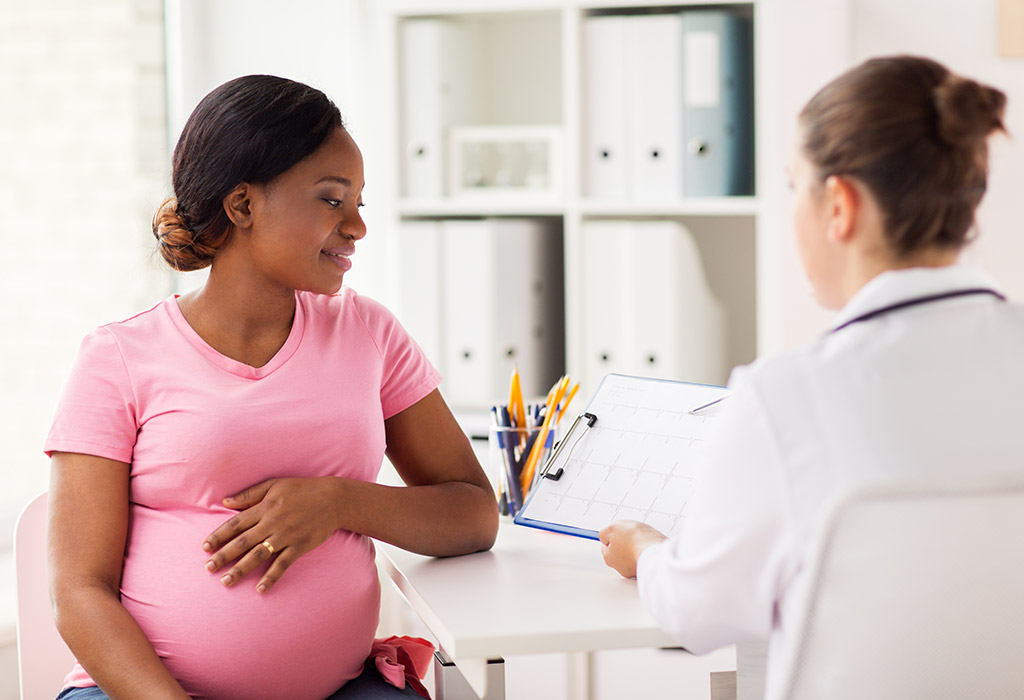In this Article
- Is It Normal to Have a High Heart Rate During Pregnancy?
- Causes of High Pulse Rate During Pregnancy
- Symptoms of Heart Palpitations During Pregnancy
- Diagnosis of Increased Heart Rate During Pregnancy
- Elevated Heart Rate Trimester Wise
- Can an Increase in Heart Rate Affect Your Pregnancy?
- How to Deal With an Increased Heart Rate While Pregnant
- Warning Signs
Be it physical, mental or emotional, a woman’s body goes through a lot of changes during pregnancy. If you are pregnant, one such change that might worry you is a change or rather increase in your heart rate. Heart palpitations (the feeling that your heart is racing or pounding) are usually harmless and happen because of cardiovascular changes. However, in many instances this seemingly common change can indicate a problem in the heart or other parts of the body, more so if it is sudden. A sudden increase in the heart rate during pregnancy should not be taken lightly. So read on to know more about it.
Is It Normal to Have a High Heart Rate During Pregnancy?
The normal heart rate of a healthy person is between 60 and 80 per minute. However, during pregnancy, it is quite common for this rate to go up to 100. An increased heart rate is called tachycardia and is a common occurrence during pregnancy.
If you are pregnant, your body will constantly work hard to provide nourishment to your growing baby. As your pregnancy progresses, the amount of blood required by your baby will increase and your heart will beat faster to pump more blood into the system.
Causes of High Pulse Rate During Pregnancy
There are a lot of factors that can lead to heart palpitations during pregnancy. They are as follows:
-
Anxiety: It is normal to worry about your baby’s health during pregnancy. But if you tend to worry a lot or get anxious, it will affect your health. Stress and anxiety during pregnancy can increase your heart rate.
-
A change in the size of the uterus: As your pregnancy progresses, your uterus will increase in size to accommodate the growing baby. As a result, your heart will pump more blood to support the uterus. In fact, towards the end of your pregnancy, about 20% of your blood will be supplied to the uterus. This means extra work for your heart, which will only add pressure on it.
-
Changes in the breast size: During and after pregnancy, your mammary glands will prepare your body for breastfeeding. When the breast tissues enlarge and breasts increase in size, the blood flow to the mammary glands will increase. This means, your heart will pump more blood than usual, which can make it pound even more.
-
Changes in the nutrient levels: Complications of the thyroid or a drop in iron levels can also increase the heart rate. Anaemia and hyperthyroidism can cause tachycardia.
-
Hormonal changes: Hormonal changes and weight gain can cause tachycardia in early pregnancy.
-
Medication: If you take cold or allergy medicines containing pseudoephedrine during pregnancy, your heart rate might increase. This increase is a sign of your body reacting negatively to medicines.
-
Lifestyle factors: Smoking cigarettes, drinking alcohol, or consuming foods or drinks high in caffeine can increase your heart rate too.
Some Other Serious Causes of Heart Palpitations
- Coronary heart disease
- Preeclampsia
- Underlying heart damage
- Heart damage from a previous pregnancy
Symptoms of Heart Palpitations During Pregnancy
You may experience the following symptoms if you have an increased heart rate during pregnancy.
- Shortness of breath even when you are sitting or lying down
- Palpitations and skipped heartbeats
- Light-headedness with dizzy spells and even fainting spells
- A persistent cough
If you experience any of these symptoms, it is best that you bring it to your doctor’s notice so that she can check whether these symptoms are normal or not.
Diagnosis of Increased Heart Rate During Pregnancy
Your doctor will conduct a series of tests to ensure that both you and your baby are in the prime of health. He will also review your medical history. If you have experienced this problem before, you should inform your doctor about it. The doctor will determine the cause of increased heart rate through an EKG or ECG that measures changes in the blood flow and heart rate.

Basis the results, the doctor will most likely suggest you to follow a healthy diet and indulge in light exercises. This will keep your weight in check and will also prevent additional pressure on the heart.
Elevated Heart Rate Trimester Wise
Cardiovascular functions serve a number of purposes during pregnancy. Apart from aiding the development of the foetus, they also impact on the mother’s physiological and metabolic functions. However, depending on the stage of pregnancy, your heart’s way of functioning also varies.
1. First Trimester
During the first trimester, your heart rate can increase by 15 to 20 beats per minute. The increase in heart rate during this trimester is usually caused by an increase in hormone levels, specifically an increase in progesterone and oestrogen. This is to signal your heart that it must provide more blood for the developing foetus.
2. Second Trimester
In this phase, your body will see a general relaxation of the smooth muscles along with dilation of the arteries to accommodate the increase in blood volume. In the second trimester, there will be hemodilution, i.e., an increase in blood volume, under the influence of hormones; these hormones can dilate the blood vessels to maintain the blood pressure. So these changes won’t affect your blood pressure – it will be normal, but they may increase your heart rate. During the fourth month, your heart will pump 30% to 50% more blood than usual and as a result, your heart rate may increase.
3. Third Trimester
During the last trimester, your heart will be at its peak of pumping blood. It will pump 40% to 90% more blood than it did in your pre-pregnancy days. This is to ensure that the rapidly growing foetus receives the oxygen and all the nutrients it requires. It also prepares your body for labour during which your heart rate will spike due to contractions and pain.
Can an Increase in Heart Rate Affect Your Pregnancy?
Heart palpitations or an increase in heart rate during pregnancy is usually a sign of a healthy pregnancy. This means that your body is working hard to ensure that your baby gets the oxygen and essential nutrients to develop healthily.
If your heart beats faster but it not accompanied by other serious symptoms, there is nothing to worry about. You must remember that this is a normal physiological response of your body.
How to Deal With an Increased Heart Rate While Pregnant
Although an increased heart rate is usually normal, if you have it, it is suggested that you make certain changes in your lifestyle for your good health. If an increase in your heart rate is because of some serious problem, your doctor will prescribe the course of treatment and suggest that you take precautions. There are many drugs available to you that can help with tachycardia, but it is best not to use them while pregnant as some medicines can hamper with your baby’s development. Before taking any medicines, you must consult a doctor.
If you experience heart palpitations during pregnancy, you can drink moderate amounts of chamomile tea or try aromatherapy with lavender – these may calm you down. You should make sure that you get enough sleep daily and that your sleep pattern remains undisturbed. Practising yoga and meditation can also calm you down, but you should clarify with your doctor before trying anything new.
Experiencing heart palpitations occasionally is normal during pregnancy, provided they return to normal on their own. But if you feel uncomfortable because of increased heart rate, you must consult your doctor at the earliest.

Warning Signs
If you notice a sudden increase in your heart rate during pregnancy which is also accompanied by some other symptoms mentioned above, it could be a sign of a serious problem, perhaps a heart condition that you were unaware of previously. Make sure that you seek immediate medical help if you experience one or more symptoms along with heart palpitations.
An increase in heart rate during pregnancy is common and happens because of the physiological changes your body goes through. Ensure that you get enough rest and do not stress during this time. Also, have an honest and open conversation with your doctor if you have any fear about your pregnancy.









